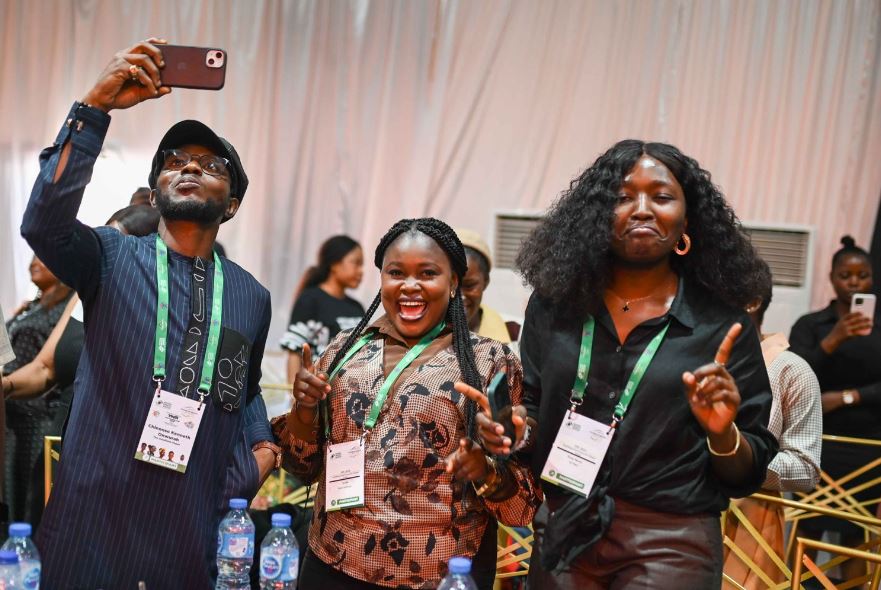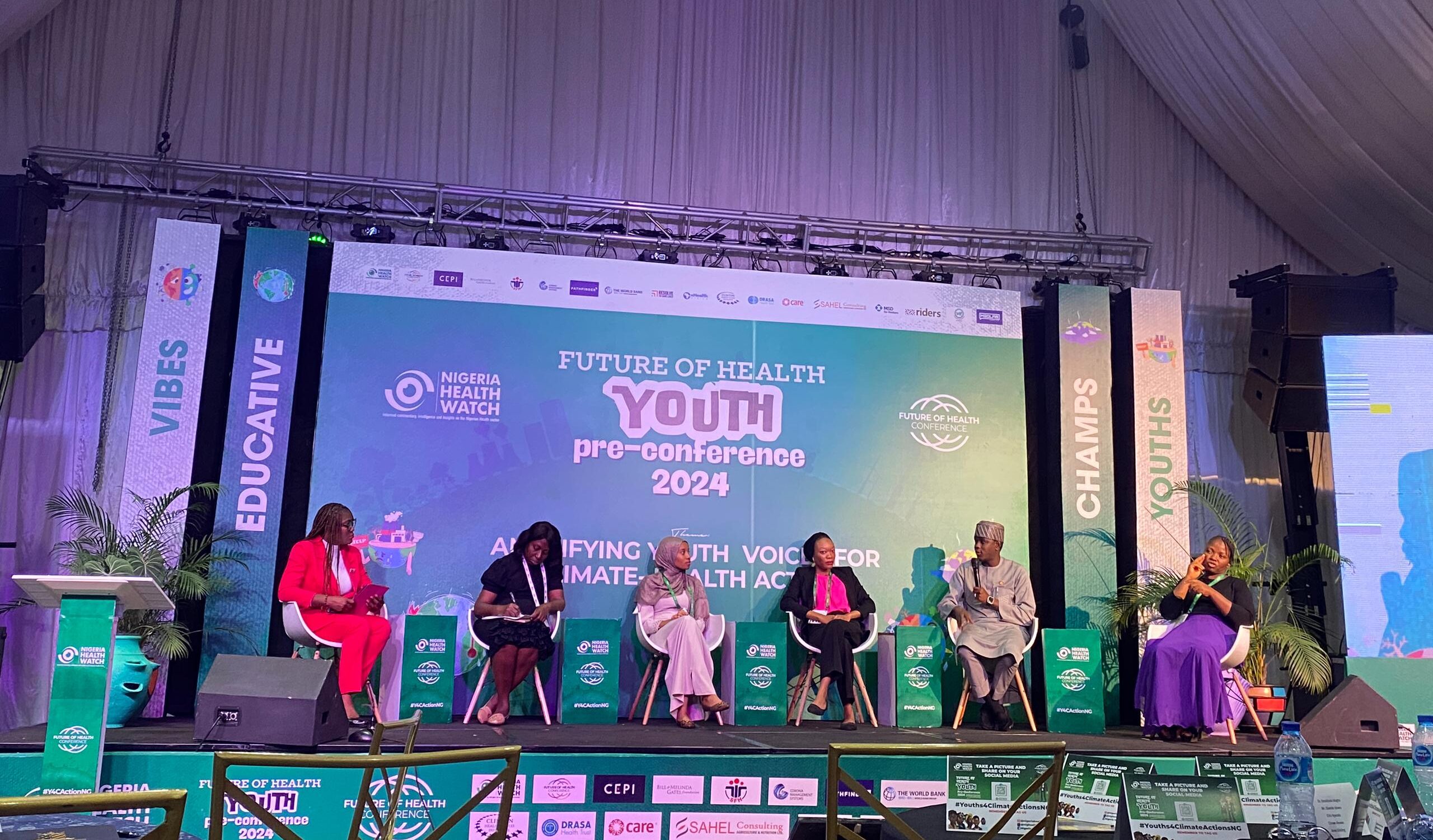9 AM on wednesday October 23, 2024 at The Wells Carlton Hotel in Abuja: A long queue snakes outside the event hall, buzzing with youthful energy. Most attendees appear to be under 30, dressed in a style reflective of their generation.
They have gathered for the Future of Health Youth Pre-Conference, a significant event uniting policymakers, youth climate activists, and young individuals passionate about climate change. Together, they aim to brainstorm solutions to the pressing climate issues affecting their communities.
The timing of this event couldn’t be more critical, said Vivianne Ihekweazu, managing director at Nigeria Health Watch, organizers of the event.
With its population of 400 million youths, Ihekweazu said Africa is at the forefront of a dual crisis: “the immediate, devastating effects of climate change and the resulting threats to public health and sustainable development.” She noted that despite contributing minimally to global emissions, the continent is suffering greatly-Increasingly severe droughts, floods, and unpredictable weather patterns are decimating crops, heightening food insecurity, and displacing millions across Africa. Rising temperatures are damaging ecosystems and threatening biodiversity, while extreme weather events exacerbate existing vulnerabilities, particularly in areas with weak infrastructure.
Ihekweazu emphasized that climate change is not just an environmental issue but a health crisis that threatens the well-being of communities across Nigeria and the broader African continent, which is why, according to her, Nigeria Health Watch is “bringing together some amazing young leaders from across [the continent] to discuss one of the greatest challenges facing our generation: the impact of climate change on health.”
A problem with a gender angle
The crisis also has a profound impact on women. According to Anne Dirkling, vice president of WonderWoman Nigeria, climate change exacerbates existing inequalities, disproportionately affecting young women and their access to healthcare and education. Extreme weather events, such as floods and droughts, can disrupt health services, damage schools, and force families to migrate, interrupting girls’ education.
Moreover, climate-induced food and water scarcity can lead to malnutrition and increased vulnerability to diseases, further threatening young women’s health and well-being. Additionally, climate change can exacerbate gender-based violence and early marriage, as families may resort to harmful coping mechanisms during crises.
Youths addressing these challenges is hampered by ignorance stemming from poverty. Godwin Lasisi, founder of the Interfaith Alliance for SDG Action Plan or IASAP said. “To engage youth in the climate change agenda, they must first be able to eat.” In Nigeria, the unemployment rate for young people (ages 15–24) reached 8.6% in the third quarter of 2023. Lasisi added, “You cannot ask them to think about tree planting and conservation when they are unsure of their next meal.”
The situation is further compounded by soaring inflation, making basic meals a luxury for many young people. As a result, they have little time for awareness about issues like ozone depletion, focusing instead on work that sustains them.
“Safe Space”
However, there is hope. Ramatu Iyimoga, the meaningful adolescent and youth engagement lead at the Society for Family Health or SFH, said that actively involving young people in co-creating climate climate solutions can be transformative. “Many young people have incredible potential but lack technical skills,” she stated. She emphasized that their inclusion should not be out of pity but rather an acknowledgment of their capabilities. “This approach has proven effective for us. For climate action and resilience, I believe this strategy should be adopted at the national level.”
Aisha Farida, co-founder of Think Green Foundation, echoed this sentiment. She stressed the importance of collaboration in addressing the climate crisis: “For example, designing a hospital isn’t solely an architect’s responsibility; health workers and the people who will use the facility must also participate in the design process.”

Youth in front row
Anwuli Nwankwo, Nigeria Health Watch’s knowledge management lead expressed hope that attendees will learn their role in combating climate change and take actionable steps. “They can engage in grassroots campaigns and educational initiatives to empower their communities to understand climate change and its consequences,” she noted.
Nwankwo also highlighted the potential for youth to develop innovative solutions to climate challenges. “We are in the AI era, so implementing AI applications can help predict and monitor floods, allowing communities to prepare in advance,” she explained, a point Omokhudu Idogho, SFH’s managing director agrees with. “young innovators can develop tech-based solutions such as mobile apps for tracking air quality, monitoring climate patterns, or supporting sustainable farming practices that mitigate the effects of climate change,” he said.
Idogho further added that “Youth-led initiatives can drive the inclusion of climate change topics in school curriculums, highlighting its impact on health, food security, and livelihoods. Educating young people about these connections can foster a generation that is more conscious of environmental challenges and committed to sustainable practices,” holding that by engaging with policymakers, and organizing community events, they can put pressure on governments to prioritize climate action.
And it is exactly what a participant who identified herself as Oyigene, said she was going to do. “I am looking forward to volunteering, using the opportunity to learn more about climate change and share that knowledge with my community,” the University of Calabar student said.
The Future of Health Youth Pre-Conference in Abuja gathered young climate activists, policymakers, and individuals to address pressing climate issues. Vivianne Ihekweazu, managing director of Nigeria Health Watch, highlighted Africa's dual crisis of climate change effects and public health challenges, noting Africa's minimal emissions but severe climate impacts such as droughts and floods. The conference emphasized the gendered impact of climate change, where women face heightened inequalities in education and healthcare.
Speakers stressed the need for youth engagement in climate action despite economic challenges, with unemployment and inflation diverting attention away from environmental issues. Ramatu Iyimoga from the Society for Family Health advocated for technical skills training for young people to contribute to climate solutions, while Aisha Farida from Think Green Foundation emphasized collaborative approaches.
Youth rights leaders like Anwuli Nwankwo encouraged grassroots activism and noted the role of technology and AI in tackling climate problems. Engaging young innovators in developing solutions and integrating climate education into school curricula are vital steps toward sustainable practices and pushing for governmental climate actions. Participants expressed eagerness to volunteer and expand climate awareness in their communities, reflecting a proactive and hopeful approach to the climate-health crisis.






